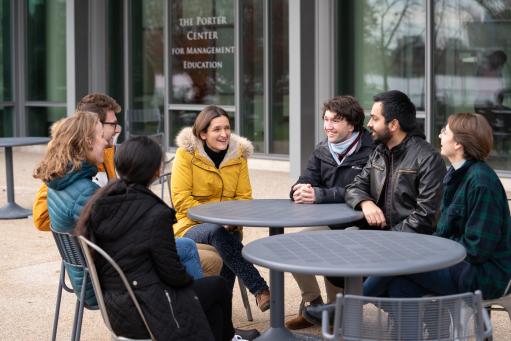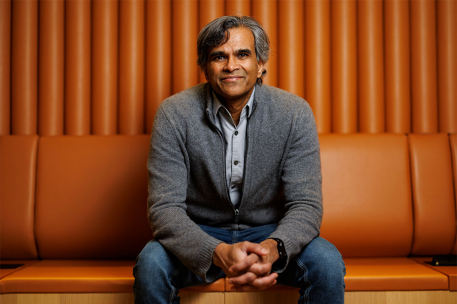Although her research focuses on daunting issues such as global poverty, MIT Professor Esther Duflo never neglects to dedicate time to something else she finds just as important: mentoring her graduate students.
To mark her unwavering support, Duflo was recently honored as “Committed to Caring” for consistently propping up graduate students, and for helping them to thrive.
Duflo is the Abdul Latif Jameel Professor of Poverty Alleviation and Development Economics in the Department of Economics at MIT, and a co-founder and co-director of the Abdul Latif Jameel Poverty Action Lab (J-PAL). She was a recipient of the 2019 Sveriges Riksbank Prize in Economics Sciences in Memory of Alfred Nobel, also referred to as the Nobel Prize in Economics, for her contributions to an experimental approach to addressing poverty worldwide. Her research focuses on the social policies intended to help those in poverty, and addresses aspects of social policies including environment, government, education, and health.
Encouraging ambitious and impactful research
Time and time again, Duflo has demonstrated to her mentees how much she cares about their ideas, research, and success. Chiefly, as one student notes, she always keeps the bigger picture in mind: She recognizes that short-term goals and achievements, while often prioritized in academia, don’t completely characterize a researcher.
Noting this, she helps her students develop their ideas into longer-term, impactful research projects. As one nominator wrote, “Esther also continuously validates and respects my research ideas, no matter how uncommon they are.” She will devote a lot of thought into a student's ideas and provide constructive feedback, but “will never discard an ambitious project just because it is ambitious.” Duflo recognizes the importance of fostering her students’ interests within their field.
As she advises her students through their graduate school experience, Duflo makes a conscious effort to connect them and their work to larger issues. Duflo’s research focuses on economic development and poverty alleviation; as a result, she encourages her students to tackle issues and projects that could affect the welfare of people on a global scale, and never discourages them from attempting to answer big, ambitious research questions.
One student noted how Esther opened their eyes to the work of development economists, writing in their nomination letter that they “learned from Esther that economists could do work that would speak to the problems of real, ordinary people whose lives had been more difficult through the circumstances of poverty and other forces outside of their control.”
Encouraging her students to take on challenging research projects is integral to Duflo’s advising approach. She aims to work with each student to identify the projects and ideas that they are most passionate about, and then helps them devise ways to tackle said projects. This kind of constructive dynamic between Duflo and her mentees is key to her advising style; as Duflo writes, “when [a] trusting relationship is established, advising is a joy. It is truly the most important and rewarding part of my job.”
Prioritizing students’ development
When it comes to mentoring her students, Duflo prefers to take a flexible approach, where she works with each student to find the degree of guidance that works best for them. As Duflo explains, “the key is to find the relationship that works for each … perhaps my only guiding principle in advising is that whenever a student wants a meeting, I am available.” Tailoring her degree of involvement to each student’s preferences enables both Duflo and her mentees to get the most out of their collaborative relationship.
Duflo has gone above and beyond in supporting her graduate students outside of helping them develop their ideas into actionable projects. One nominator highlighted how Esther donated her Nobel Prize winnings to the Weiss Fund for Research in Development Economics, which is dedicated to supporting students and other researchers in development economics.
In an interview with WBUR, Duflo explained the motivation for her donation: “As a child, I read about Marie Curie, who used the proceeds of her first Nobel prize to buy a gram of radium to further her research. … Our field is a collaborative one, so supporting the next generation of economists is our ‘gram of radium.’” Acts such as this demonstrate, beyond a doubt, Duflo’s commitment to expanding opportunities for young scientists to conduct groundbreaking research.
It is clear that Duflo’s students greatly appreciate how constructive and collaborative she is. After describing Duflo’s support of their ambitious research agenda, one student nominator wrote, “Every time I meet with her, I feel like I have wings.”


